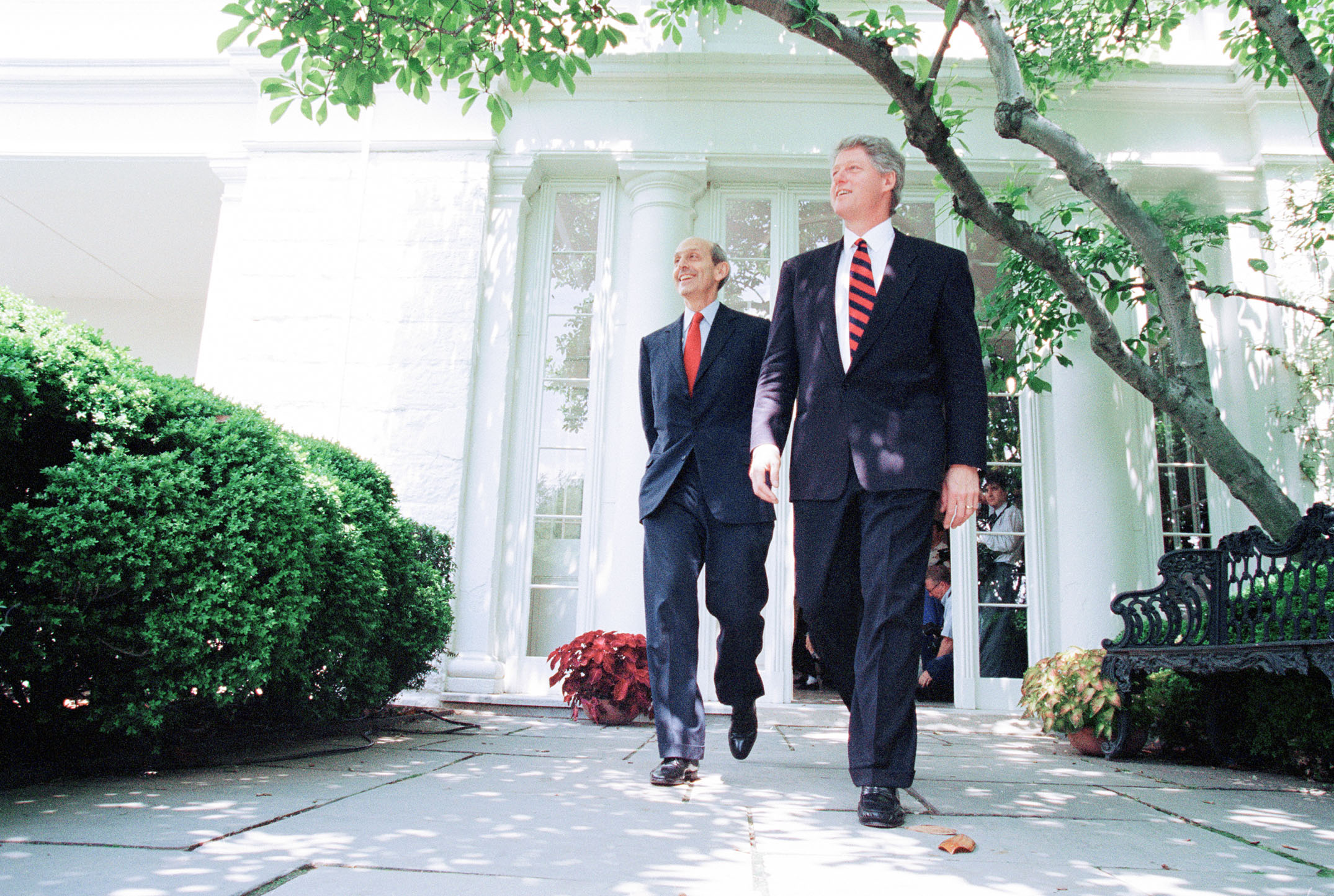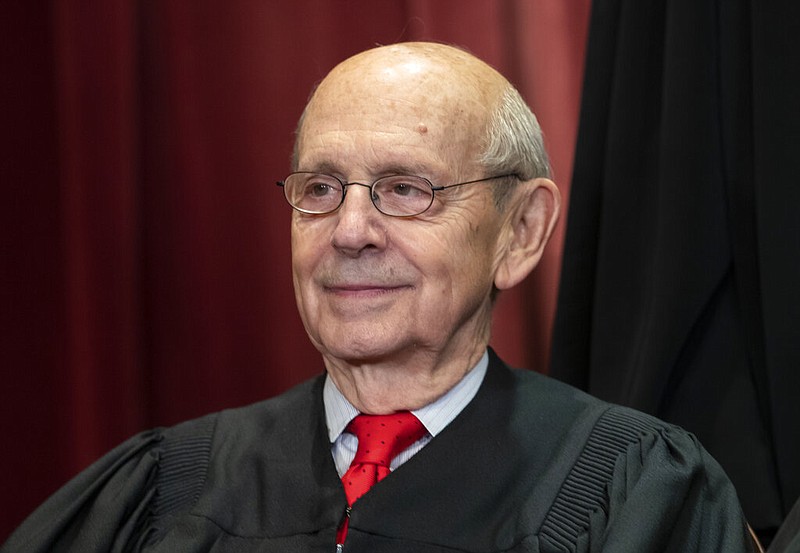WASHINGTON -- Supreme Court Justice Stephen Breyer is retiring, numerous sources said Wednesday, giving President Joe Biden his first high court opening, which he has pledged to fill with the court's first Black woman.
Breyer, 83, has been a pragmatic force on a court that has grown increasingly conservative, trying to forge majorities with more moderate justices right and left of center. His retirement will give Biden the chance to name and win confirmation of a replacement before next fall's election when Republicans could retake the Senate and possibly block future nominees.
Democrats are planning a swift confirmation, perhaps even before Breyer officially steps down, which is not expected before summer.
He has been a justice since 1994, appointed by President Bill Clinton. Breyer replaced Justice Harry Blackmun, the author of the Roe v. Wade decision that legalized abortion.
Breyer has been under pressure to resign from liberals pointing to the example of Justice Ruth Bader Ginsburg. She declined to step down when Democrats held the White House and Senate during the Obama administration, and died when former President Donald Trump and Republicans were in control, shifting the court's ideological balance.
Breyer's departure won't change the 6-3 conservative advantage on the court because his replacement will likely be confirmed by a Senate where Democrats have a slim majority.
Senate Majority Leader Charles Schumer, D-N.Y., said Biden's nominee "will receive a prompt hearing in the Senate Judiciary Committee and will be considered and confirmed by the full United States Senate with all deliberate speed." A White House decision on a nominee could take several weeks, Biden aides and allies said.
[Video not showing up above? Click here to watch » arkansasonline.com/127biden/]
Republicans who changed the Senate rules during the Trump era to allow simple majority confirmation of Supreme Court nominees appeared resigned to the outcome.
Sen. Lindsey Graham, R-S.C., said in a statement: "If all Democrats hang together -- which I expect they will -- they have the power to replace Justice Breyer in 2022 without one Republican vote in support."
Liberal interest groups expressed relief. They have been clamoring for Breyer's retirement, concerned about confirmation troubles if Republicans retake the Senate.
"Justice Breyer's retirement is coming not a moment too soon, but now we must make sure our party remains united in support of confirming his successor," Demand Justice Executive Director Brian Fallon said.
Among the names being circulated as potential nominees are California Supreme Court Justice Leondra Kruger, U.S. Circuit Judge Ketanji Brown Jackson, prominent civil rights lawyer Sherrilyn Ifill and U.S. District Judge Michelle Childs, whom Biden has nominated to be an appeals court judge. Childs is a favorite of Rep. James Clyburn, D-S.C., who made a crucial endorsement of Biden just before South Carolina's presidential primary in 2020.
Biden's pledge to name the first Black woman to the Supreme Court was made during the 2020 presidential campaign. Since he took office a little more than a year ago, he has been focused on increasing racial, ethnic and experiential diversity in the lower federal courts. He has doubled the number of Black women who serve on appellate courts just below the Supreme Court, with three more nominees pending.
Asked Wednesday if Biden might select Vice President Kamala Harris, White House press secretary Jen Psaki said the president has "every intention" of running with Harris as his running mate in 2024.
Democratic Rep. Joyce Beatty of Ohio, the chairwoman of the Congressional Black Caucus, said, "We know that when America's boardrooms, legislatures and even the Supreme Court start to resemble America, we all benefit."
Nomination of a Black woman could also help Biden politically with some of the Democratic Party's most important Election Day supporters. He has been criticized by Black leaders and groups for failing so far to persuade the Senate to pass legislation shoring up voting rights that are being restricted in a number of Republican-led states.
[Video not showing up above? Click here to watch » arkansasonline.com/127psaki/]
Change comes slowly to the Supreme Court. Of the 115 justices in U.S. history, there have been just five women, beginning with Sandra Day O'Connor in 1981. One of the five, Justice Sonia Sotomayor is a Latina. Clarence Thomas and the late Thurgood Marshall are the only two Black men who have served on the court.
The president wouldn't address reports of Breyer's retirement Wednesday.
"Every justice should have an opportunity to decide what he or she is going to do and announce it on their own," Biden said. "Let him make whatever statement he's going to make, and I'll be happy to talk about it later."
MIDDLE GROUND
Breyer authored two major opinions in support of abortion rights on a court closely divided over the issue, and he laid out his growing discomfort with the death penalty in a series of dissenting opinions in recent years.
Breyer's views on displaying the Ten Commandments on government property illustrate his search for a middle ground. He was the only member of the court in the majority in both cases in 2005 that barred displays in two Kentucky courthouses but allowed one to remain on the grounds of the state Capitol in Austin, Texas.
In more than 27 years on the court, Breyer has been an active and cheerful questioner during arguments, a frequent public speaker and quick with a joke, often at his own expense. He made a good-natured appearance on a humorous National Public Radio program in 2007, failing to answer obscure questions about pop stars.
He is known for his elaborate, at times far-fetched, hypothetical questions to lawyers during arguments. He taught antitrust law at Harvard earlier in his professional career.
He also spent time working for the late Sen. Edward Kennedy when the Massachusetts Democrat was chairman of the Senate Judiciary Committee. That experience, Breyer said, made him a firm believer in compromise.
Still, he could write fierce dissents, as he did in the Bush v. Gore case that effectively decided the 2000 election in favor of Republican George W. Bush. Breyer unsuccessfully urged his colleagues to return the case to the Florida courts so they could create "a constitutionally proper contest" to decide the winner.
At the end of a trying term in June 2007 in which he found himself on the losing end of roughly two dozen 5-4 rulings, his frustrations bubbled over as he summarized his dissent from a decision that invalidated public school integration plans.
"It is not often that so few have so quickly changed so much," Breyer said in a packed courtroom.
His time working in the Senate led to his appointment by President Jimmy Carter as a federal appeals court judge in Boston, and he served there for 14 years. His 87-9 high court confirmation was the last with fewer than 10 dissenting Senate votes.
Breyer's opinions were notable because they never contained footnotes. He was warned off such a writing device by Arthur Goldberg, the justice for whom Breyer clerked as a young lawyer.
"It is an important point to make if you believe, as I do, that the major function of an opinion is to explain to the audience of readers why it is that the court has reached that decision," Breyer once said. "It's not to prove that you're right. You can't prove that you're right; there is no such proof."
Breyer's usual tone was hopeful and optimistic. In a 2010 book called "Making Our Democracy Work," Breyer said informed citizens, elected officials and judges must constantly work together with the aim of improving government. Yet from his Supreme Court chamber, he watched each year as Congress grew ever more divided, with members unwilling to work with or even speak with those on the other side of the aisle.
Over the years, several justices -- but not Breyer -- quit attending the annual State of the Union speech in which the president addresses the House and Senate in a joint session.
His colleagues complained that the speeches had turned into partisan pep rallies. Breyer believed that attending was a symbol of the different branches of government joining to work together in the year ahead.
In an interview with The New York Times, he acknowledged that the politicians who had transformed confirmation hearings into partisan brawls held a different view, but he said the justices acted in good faith, often finding consensus and occasionally surprising the public in significant cases.
"Didn't one of the most conservative -- quote -- members join with the others in the gay rights case?" he asked in the interview, referring to Justice Neil Gorsuch's 2020 majority opinion in a ruling that a landmark civil rights law protects gay and transgender workers from workplace discrimination.
Though he was often on the losing side when the justices were closely split, Breyer disputed the view that the outcomes turned on the political views of the justices.
Asked in a 2020 interview about what most people get wrong about the court, he replied: "I think the most common perception, which is wrong, in my opinion, is they think that we're just junior-league politicians and they think that all these cases are decided on political grounds. We won't always get it right, but we're trying to do our best to figure out how law applies in this situation. And that's sometimes pretty tough. And the decisions people think are so obvious, they're not so obvious."
PERSONAL LIFE
Born in San Francisco, Breyer became an Eagle Scout as a teenager and began a stellar academic career at Stanford, graduating with highest honors. He attended Oxford, where he received first-class honors in philosophy, politics and economics.
Breyer then attended Harvard Law School, where he worked on the Law Review and graduated with highest honors.
He taught law at Harvard University and became a protege of Edward Kennedy and served for a time as one of Kennedy's top aides in the Senate.
Breyer was the only justice to have worked for years in Congress, and he argued for interpreting the law in a way that carried out the intent of the legislators who wrote them. As an aide to Kennedy, he played a key role in the passage of the Airline Deregulation Act of 1978. He also helped shape the federal sentencing guidelines with the aim that prison terms should reflect the severity of the crime, not the judge who handled down the sentence.
Kennedy played a key role in winning him an appeals court seat in Boston in 1980 and a Supreme Court appointment in 1994.
Breyer and his wife, Joanna, a child psychologist and daughter of the late British Conservative leader John Blakenham, have three children -- daughters Chloe and Nell and a son, Michael -- and six grandchildren.
Information for this article was contributed by Mark Sherman, Michael Balsamo and Colleen Long of The Associated Press; by Adam Liptak of The New York Times; and by David G. Savage of the Los Angeles Times (TNS).
 Then-President Bill Clinton and Supreme Court nominee Stephen Breyer walk to the Rose Garden of the White House on May 16, 1994, where Clinton officially introduced Breyer to the nation. Breyer replaced Justice Harry Blackmun, the author of the Roe v. Wade decision that legalized abortion. (AP/Doug Mills/file)
Then-President Bill Clinton and Supreme Court nominee Stephen Breyer walk to the Rose Garden of the White House on May 16, 1994, where Clinton officially introduced Breyer to the nation. Breyer replaced Justice Harry Blackmun, the author of the Roe v. Wade decision that legalized abortion. (AP/Doug Mills/file)
